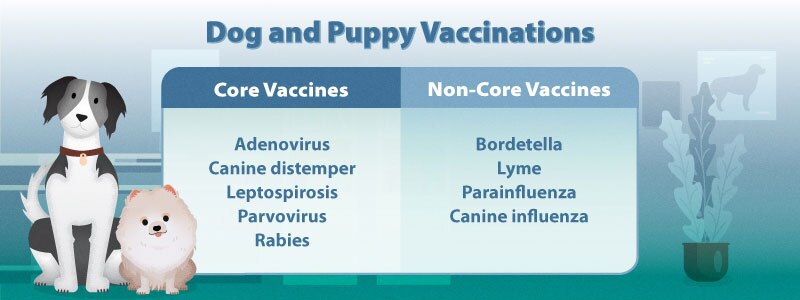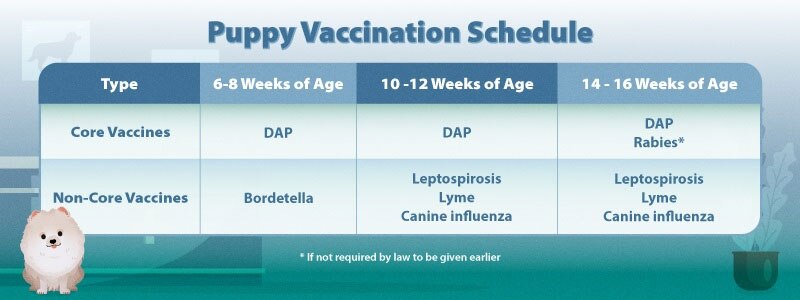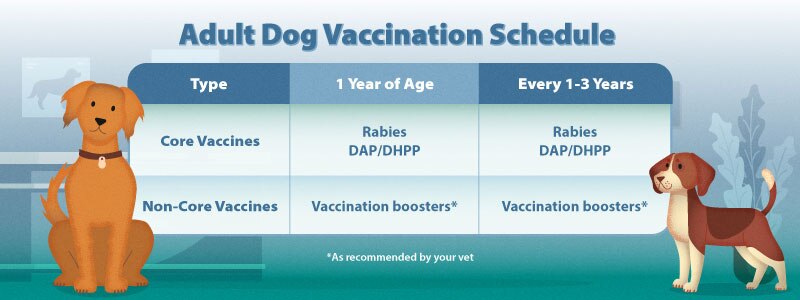Are you the proud owner of a new dog or puppy, or considering adding a new bundle of fur to your family? There's a lot to think about and get done as a new dog parent, and vaccinations should be at the top of your list. Vaccinations are necessary to protect your dog and your community from diseases that are both serious and preventable.
Below, you'll find a basic guide to vaccinations, including both an adult dog vaccination schedule and a schedule for puppy vaccines, as well as their estimated costs.
What Are Dog Vaccinations?
Dog and puppy vaccinations are a series of shots your pooch will need throughout their lifetime to stay healthy and prevent the spread of disease.
When your dog or puppy is vaccinated, they'll receive a vaccine containing antigens that stimulate your dog's immune system by simulating an organism that causes disease. This trains your pup's immune system to recognize the organism so that if they're ever exposed to it in real life, their immune system will be better able to fight it off.
Common dog vaccinations include:
- Adenovirus vaccine
- Bordetella vaccine
- Canine distemper vaccine
- Canine influenza vaccine
- Leptospirosis vaccine
- Lyme vaccine
- Parainfluenza
- Parvovirus vaccine
- Rabies vaccine
Dog and Puppy Vaccines Cost
The national average cost* of a dog vaccine in the United States can vary from $27 to $96, depending on the brand of vaccine used, the type of clinic and other factors.1
| Vaccine | Average cost |
|---|---|
| Bordetella | $38 |
| DHPP | $42 |
| Canine influenza (H3N2 and H3N8) | $53 |
| Leptospirosis | $34 |
| Lyme | $50 |
| Rabies | $35 |
The cost of puppy and adult dog vaccinations can also vary by region, as well as from one vet to the next. Some veterinarians or states may also require a veterinary exam or proof of a recent exam before giving your dog a vaccine, which can add to the overall cost.
Puppy Vaccination Guide
Newborn and nursing puppies receive antibodies from their mother that protect them from common dog illnesses. But after they're weaned onto solid food, those antibodies fade. Puppies should begin building immunity through a series of vaccinations as soon as they're old enough to leave their mother.
If you get your puppy from a reputable breeder, they'll typically take care of the first round of shots, and you'll be responsible for boosters. The same usually goes for adopting from a shelter. Otherwise, you'll need to get your pup's first round of shots taken care of as soon as possible after you bring them home and before allowing them to be around other dogs.
What Shots Do Puppies Need?

Dog and puppy vaccinations fall into two categories containing specific vaccinations. These two categories are as follows:
- Core puppy vaccines
- Non-core dog and puppy vaccines
Core puppy vaccines
The shots that are considered essential for your puppy's health, all of which your veterinarian may refer to as “core" vaccines, include:
- Adenovirus vaccine. Otherwise known as canine hepatitis, this highly contagious virus attacks a dog's liver, kidneys, eyes, lungs and spleen. This viral infection is unrelated to the types of hepatitis that affect humans.
- Canine distemper vaccine. Canine distemper is caused by a virus that severely attacks the respiratory, nervous and gastrointestinal (GI) systems. It's highly contagious and potentially fatal, affecting animals like raccoons and skunks as well as dogs, and can be passed between species through sneezing or coughing. It can also be transmitted between dogs who share water and food bowls or other equipment.
- Leptospirosis vaccine. Lepto is a bacterial infection that can be spread from dogs to humans. While dogs infected with leptospirosis may not show any symptoms, symptoms can be quite severe, including fever, abdominal pain, appetite loss, infertility, jaundice and kidney failure. Because of the chance of spreading to humans, it's important to include this vaccine if your vet advises it.
- Parvovirus vaccine. The parvo vaccine for puppies protects against a dangerous and highly contagious virus that attacks the GI system, causing appetite loss, vomiting, severe diarrhea and severe dehydration. This virus is dangerous for any dog, but especially so for puppies under 4 months of age.
- Rabies vaccine. Rabies vaccines for dogs are required by law in the U.S. All dogs should be vaccinated for rabies between 12 to 16 weeks of age, and then again at age 1. Depending on your local regulations, revaccination should happen every one to three years. The best time to get your dog vaccinated for rabies is when they are young.
The adenovirus, canine distemper and parvovirus vaccines are usually combined in a single vaccine cocktail that's commonly referred to as DAP or DHP. Some vets offer a DAPP or DHPP shot, which also includes antigens for parainfluenza, and some offer a DHLPP shot that also includes leptospirosis, which is considered a core vaccine.
Core vaccines are required for all dogs and puppies. A series of three core combination vaccines should be given between 6 and 16 weeks at intervals of two to four weeks apart and then repeated annually. Some veterinarians may switch to a three-year vaccination schedule after a dog reaches 2 years of age.
Note: There is no vaccine against seizures because there are so many different causes. The best protection is to ensure your dog's distemper and rabies vaccines stay up to date.
Non-core dog and puppy vaccines
Non-core puppy vaccinations are those that are considered optional. Your vet may recommend them based on your puppy's level of susceptibility, determined by factors like age, activities and geographic location.
For example, if you live in an area where deer ticks are common, your vet may recommend that you vaccinate your pup for Lyme disease. Or, if your pup will spend a lot of time around other dogs — at a dog park, doggie daycare or a boarding kennel — it's strongly advised to have them vaccinated for Bordetella, a virus that causes kennel cough. (Note: If your dog has been diagnosed with kennel cough or is exhibiting symptoms of the disease, wait until they are symptom-free before getting any vaccinations.)
In addition to those two vaccines, non-core vaccinations also include parainfluenza and canine influenza.
In summary, non-core dog and puppy vaccines are optional and include:
- Bordetella vaccine. Bordetella (canine infectious respiratory disease complex or CIRDC) is a highly infectious bacterial infection that is the primary cause of kennel cough, a cold- or flu-like illness that causes coughing and vomiting. Although rare, it can also result in seizures and death. Proof of the Bordetella vaccine for dogs is usually required if you plan to board your dog or puppy, place them in daycare or attend group training classes. There is also a variant of CIRDC called atypical canine infectious respiratory disease complex (aCIRDC), but there is not yet a vaccine for this. Your pet's best protection is to keep their vaccines up to date.
- Lyme vaccine. Lyme disease is a tick-borne illness that affects dogs as well as humans. While humans develop a telltale rash that helps identify this disease, it's much harder to diagnose in dogs, and even if treated quickly, relapses can impact your dog's health for months or even years. It's important to get the Lyme disease vaccine for dogs if you live in an area where this illness is prevalent.
- Parainfluenza and canine influenza vaccines. Vaccinating your dog or puppy for these viruses will help protect them from catching or spreading other forms of kennel cough. Though usually less severe than Bordetella, these respiratory illnesses can become serious and even deadly in rare cases. These vaccines are advisable if your dog will be around other dogs whose vaccination history you don't know and may be required if you want to board your pup.
Puppy Vaccination Schedule

A typical puppy vaccination schedule is laid out below. You'll need to talk to your vet to determine your puppy's likelihood of exposure to illnesses that aren't included in the core vaccination schedule and which, if any, non-core vaccines they should receive.
| Age | Core vaccines | Non-core vaccines |
|---|---|---|
| 6 to 8 weeks |
|
|
| 10 to 12 weeks |
|
|
| 14 to 16 weeks |
|
|
Adult Dog Vaccination Guide
Both the core and non-core vaccinations are the same for full-grown adult and senior dogs as they are for puppies. Adult dogs require booster shots to be administered every one to three years to maintain their immunity to the diseases they were inoculated against as puppies.
Typically, at a year old, your vet will provide a booster of both the DAP (or DHPP) and rabies vaccinations, as well as any non-core vaccinations you and your vet determine your dog should have.
The core vaccines, both DAP/DHPP and rabies, have both one-year and three-year options available. Typically, after the first year, your dog will receive the DAP shot once every three years. The frequency of the rabies shot varies by state, with many states requiring an annual booster shot for this disease. Otherwise, your dog will only need to get the rabies booster once every three years as well. Your vet can tell you about the laws in your state regarding rabies vaccinations.
As for non-core vaccines, again, your vet will make recommendations based on your location, lifestyle and other factors that determine your pet's chances of exposure. These shots are given once a year, although the Bordetella vaccine may be given every six months, especially if you regularly board your dog or leave them in doggie daycare.
Adult Dog Vaccination Schedule

Here's an at-a-glance schedule for when your adult dog should be vaccinated. Keep in mind that the frequency of rabies vaccinations will depend on your state's laws and regulations.
| Timing | Core vaccines | Non-core vaccines |
|---|---|---|
| At age 1 year old |
|
|
| Every one to three years |
|
|
Deworming Vaccine for Dogs and Puppies
Intestinal parasites are frequent among puppies and dogs. A dewormer can provide dogs protection from potential diseases caused by these parasites.
Deworming with an oral prescription dewormer, such as pyrantel pamoate or fenbendazole, should take place every two weeks starting at 3 weeks of age. Once a puppy reaches 8 weeks, they can instead start taking a monthly heartworm preventative that also contains a dewormer for intestinal worms.
Important note: Regular dewormers do not treat all types of intestinal parasites, so additional fecal testing for intestinal parasites is also highly recommended.
Titer Testing for Dogs
If you have concerns about over-vaccinating your pet, you can ask your vet about doing a titer test. This will measure the antibodies present in your dog's blood to see whether or not a certain vaccine is needed. However, you can't opt out of the rabies booster, regardless of whether your dog's blood still carries antibodies against it.
Further, the potential consequences of not sticking to your vet's recommended rabies vaccination schedule may be too grave. Rabies is both painful and fatal in almost every case, as well as highly contagious. Even if your dog never gets this disease, if they bite someone and aren't legally up to date on their rabies shot, they can be taken away and put into quarantine or even euthanized.
With that said, as far as the other vaccinations are concerned, titer testing can help prevent the parvo and distemper viruses. This reduces the overall number of vaccinations your dog receives during their lifetime, along with the potential side effects that come with them.
How Long Are Dog Vaccines Effective?
Both the core and non-core vaccines are considered effective for one year. While some DAP and rabies vaccines are labeled as being effective for up to three years, keep in mind that the contents of those vaccines may be no different from those that are labeled as one-year vaccines. The difference in labeling is determined primarily by whether or not the manufacturer tested the vaccine's efficacy for up to three years.
Dog Vaccination Side Effects
While severe adverse reactions don't occur often, potential side effects might be another reason to consider titer testing before your dog's adult booster shots.
Vaccination side effects may include:
- Anaphylactic shock, which may include seizures and/or collapse
- Appetite loss
- Diarrhea
- Difficulty breathing
- Fever
- Hives or swelling of the face or paws
- Pain or swelling at the injection site
- Sluggishness
- Vomiting
It's best to get your dog their vaccinations at a time when you can closely monitor them for a day or two afterward and call your vet at any sign of a serious adverse reaction.
Puppy and dog vaccinations are an essential part of keeping your dog healthy so they can live a long, happy life. Consult your veterinarian for the best vaccines and shot schedule for your four-legged family member.
CareCredit Credit Card Financing for Dogs
Taking good care of your pet's well-being from nose to tail is essential. Make sure to stay up to date on their regular checkups at the vet to help keep your pet happy and healthy for a lifetime of love. You can use your CareCredit credit card for pet care throughout the year for routine veterinary services as well as emergencies and surgeries.** Use our Acceptance Locator to find a veterinarian near you that accepts CareCredit.
CareCredit is there for you and your pet every step of the way; continue your wellness journey by downloading the CareCredit Mobile App to manage your account, find a provider on the go and easily access the Well U blog for more great articles, podcasts and videos.
In addition to pet care, you can also use your CareCredit credit card for dentistry, cosmetic, vision, hearing, health systems, dermatology, pharmacy purchases, spa treatments and so much more within the CareCredit network. How will you invest in your health and wellness next?
Expert Reviewer
Dr. Kathy Wiederkehr (Wentworth), V.M.D.
Dr. Kathy Wiederkehr (Wentworth) has been practicing veterinary medicine at pet care facilities in California since 2001. Most recently, she served as medical director of the VCA PetPoint Medical Center and Resort in Irvine. She is a graduate of the University of Pennsylvania School of Veterinary Medicine and became board-certified as a diplomate in Canine and Feline Practice by the American Board of Veterinary Practitioners in 2010.
Author Bio
Abbie Mood is a freelance writer with more than 15 years of experience. She has worked with clients of all sizes to create compelling content and she has written for the American Kennel Club, Marriott Bonvoy, Women’s Health Online, Headspace and more.









